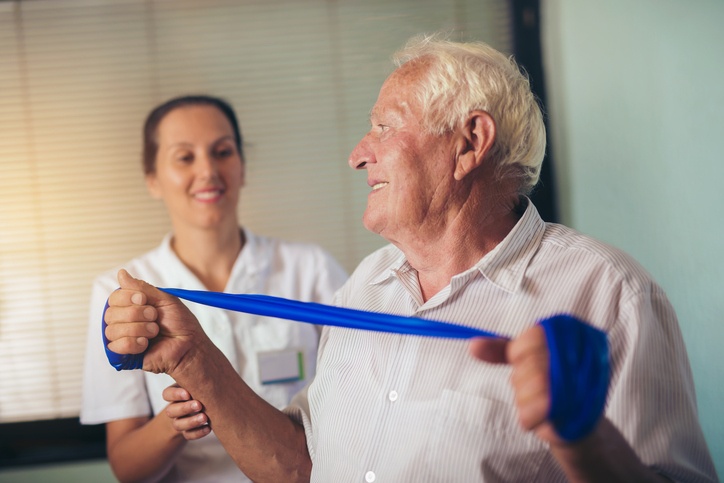Life changes drastically after a heart attack or heart surgery. It's essential to evaluate your lifestyle to ensure you're caring for this important muscle and to do what you can to prevent a future cardiac event. It can seem overwhelming, but that's what cardiac rehabilitation is all about: you don't have to do it alone.
What Is Cardiac Rehabilitation?
The National Heart, Lung, and Blood Institute explains it like this:
"Cardiac rehabilitation, also called cardiac rehab, is a medically supervised program for people who have had a heart attack, heart failure, heart valve surgery, coronary artery bypass grafting, or percutaneous coronary intervention. Cardiac rehab involves adopting heart-healthy lifestyle changes to address risk factors for cardiovascular disease."
A team of doctors, therapists, nutritionists, and more will help you build a plan to best suit your needs, taking your medical history and current condition into consideration. Cardiac rehab doesn't look exactly the same for everyone. The program is developed with you in mind.
Cardiac rehab consists of three parts, which the American Heart Association considers equally important:
- Exercise: Your rehab team will provide you with an appropriate exercise program and show you how to perform the exercises safely and effectively.
- Education: Understand and manage your risk factors: quit smoking, eat healthy meals, and learn more about heart health.
- Stress Reduction: Stress is hard on your body, and that includes the heart. Learn how to manage stress in your life.
Cardiac rehabilitation programs usually last about three months, but this depends on you and your unique situation. Of course, what you learn during the course of your program will continue to be a part of your heart-healthy lifestyle as you move forward. Rehab helps you develop the habits you'll need to help you stay healthy for life.
Your cardiac rehabilitation may be an outpatient program, or you could choose a short-term stay in a rehabilitation center. This is ideal if you'd like some extra assistance during your program (especially if you're caring for a wound following a surgery), and it's a great opportunity to meet others who have had similar cardiac experiences. It also allows you to immerse yourself fully in the program to truly embrace the healthy lifestyle changes.
What Are the Benefits of Cardiac Rehab?
A heart attack or a heart procedure can be frightening. It may disrupt what you believed about your health and your life. Getting back on track to live a healthier lifestyle is easier when you have help. The benefits of a rehab program are far-reaching:
Improved Physical Fitness
You know you need to exercise, but maybe you don't know where to start. A rehab team of doctors and therapists will design a workout program and ensure you're doing the exercises correctly. They'll monitor your progress and encourage you to complete all advised exercises. As many exercisers will tell you, when you start a program alone, it's easy to stop early or skip a few exercises; however, missing out on pieces of the fitness program will delay your progress. When you stick to your program, you'll notice the improvements throughout your daily life: less shortness of breath and greater ease climbing stairs, carrying groceries, and playing with grandchildren.
Overall Health and Well-Being
The lifestyle changes required to improve your heart health are good for your entire body and mind. Your heart isn't the only part of you that will benefit from exercise and healthy eating. You'll likely notice improvements in your mood, energy levels, sleeping habits, and more. These are just a few of the health benefits you'll likely experience during and after cardiac rehab:
- Lower risk of heart attack and reduced hospital stays related to heart issues.
- Lower blood pressure.
- Lower stress, anxiety, and depression.
- Decreased severity of angina and dependence on related medications.
- Smoother bypass surgery recovery.
- Improved fitness and ability to stay active for longer periods of time.
- Weight loss.
- Improved levels of cholesterol and triglycerides.
Support
During cardiac rehab, you have an entire team of professionals devoted to your care and improvement. You have guidance and support not only for your physical needs, but your mental and emotional needs, as well. Your team is prepared to answer your questions and help you understand the importance of the process. During a short-term stay in a rehabilitation center, you also have the support of your fellow residents who are going through their own rehab programs.
- As the AHA says, "Cardiac rehab doesn't change your past, but it can help you improve your heart's future." For more information about cardiac rehab, or to schedule a visit to see what rehabilitation is like at Church Home LifeSpring, please contact us.


